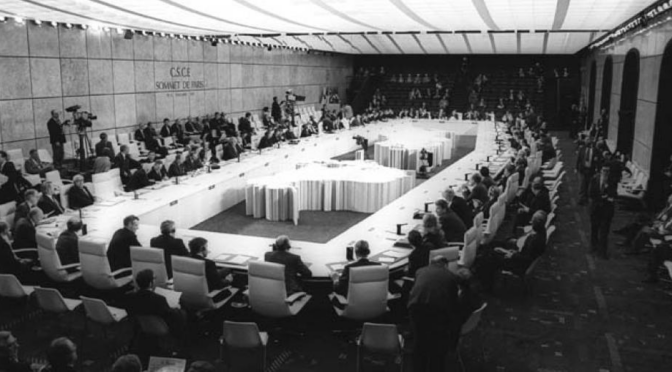Droits de l’homme, paix et sécurité en Europe dans la perspective de l’exil politique en tant qu’acteur non étatique dans la politique internationale
Cet événement est organisé par l’Institut d’histoire contemporaine de l’Académie tchèque des sciences en coopération avec le CEFRES.
Date : 21–23 octobre 2025
Lieu : Archives du Parlement de la République tchèque, Komunardů 1634/44, Prague 7
Langue : anglais
This year, we commemorate the 50th anniversary of the signature of the Helsinki Accords and the launch of the Helsinki Process, which significantly changed the political situation in Europe, leading to the collapse of the Eastern Bloc from 1989 to 1991. Through follow-up meetings of the Conference on Security and Cooperation in Europe (CSCE), many government representatives and non-governmental organizations in the West could criticize the undemocratic regimes in the East, particularly for their violations of human and civic rights. Alongside politicians, intellectuals, media, and human rights organizations engaged in the Helsinki Process and worked together with dissidents from the other side of the Iron Curtain. An important but so far unheeded actor was the political and cultural multi-generational exile from Central and Eastern Europe. These exile groups possessed political, cultural, and social capital to affect the Western political public in favor of their interpretation of the Helsinki Process. Moreover, the exiles were the essential mediators between the West and the dissidents in their homelands as they secured communication, information transfer, and material support in both directions.
Programme
Tuesday October 21
Public debate with dissidents and exiles
- Symbolic opening on the eve of the workshop
- Preliminarily invited participants: Jan Kavan, Martin Palouš, Jana Stárková
Workshop
The workshop will take place on both days, 9 a. m. to 6 p. m. Each panel will consist of three presentations of papers (by 15 minutes for each one), followed by questions from a commentator (by 15 minutes for all papers). The discussion with other participants will close the panel.
Wednesday October 22
9:30 Greeting
9:45-11:15 Panel 1
- Anna Mazurkiewicz: Helsinki Conference As a “Funeral Ceremony for 100 Million People of Eastern Europe”
- Kacper Szulecki: Between Geopolitical Fantasies and Foreign Policy Blueprints: Central European Exilic Intellectuals and the Post-Cold War Order
- Petr Orság: From Sceptical Sirens of Helsinki to an Awakened Volcano: Exile (Not Only) Communication Networks and Making the Invisible Visible
11:15-11:30 Coffee Break
11:30-13:00 Panel 2
- Michaela Lenčéšová: Discussions on the Interpretation of Human Rights in Slovak Political Emigration
- Una Blagojević: The Network of Yugoslav ‘Exiles’: Intellectuals and the Interpretations of Human Rights
- Ana-Maria Cătănuș: Fighting Goliath: Revisiting the Story of the Paris-Based Ligue for the Defence of Human Rights in Romania
13:00-13:45 Lunch
13:45-15:15 Panel 3
- Kristina Andělová: The Reflection of the Helsinki Accords by the Czechoslovak Socialist Opposition in Exile
- Maroš Timko: The Spanish Communist Exile in Czechoslovakia Between the Prague Spring and the CSCE (1968–1975)
- Tomáš Zahradníček: The Czechoslovak Social Democrats in Exile and Hesitation about Policy of Human Rights
15:15-15:35 Coffee Break
15:35-17:05 Panel 4
- Lars Frederik Stöcker: “A Lifeline to the West: Exchange and Cooperation between Ants Kippar’s Relief Centre for Estonian Prisoners of Conscience and the Soviet Estonian Dissident Community”
- Olga Rosenblum: Mediating between the West and Russia as a Political or Humanitarian Act: Discussions and Practices in Pavel Litvinov’s Circle
- Tatsiana Astrouskaya: The Helsinki Process and Hopes for National Revival. Belarusian Émigré Publishing in London After 1975
Dinner
Thursday October 23
9:00 Opening
9:15-10:45 Panel 5
- András Mink: 1956 Exiles and the Hungarian Opposition
- Jakub Mikulecký: Prisons and Labor Camps Themes in Bulgarian Exile Literature (1970–1989): Traumatic Memory as a Discursive Instrument of Psychological Warfare
- Gabriela Romanová: Charter 77 in Vienna
10:45-11:05 Coffee Break
11:05-12:35 Panel 6
- Peter Jašek: Slovak Broadcast in West and Human Rights After the Helsinki Final Act
- Ioana Macrea-Toma: What Does “Information” Mean in the Case of Human Rights Activism? Romanian Exile Actors as Knowledge Factotums
- Jakub Tyszkiewicz: Jan Nowak-Jeziorański’s Role in Shaping a Pro-Polish Lobby in the U.S. During the 1970s and 1980s
12:35-13:30 Lunch
13:30-15:00 Panel 7
- Jana Stárková: The Czechoslovak Political Émigré in Austria, 1968-1989
- Mioara Anton: The Romanian Exiles in the United Kingdom in the 1980s: The Campaigns to Defend Human Rights and Stop the Systematization of Villages
- Bernd Robionek: The Human Rights Issue in the anti-Communist Croatian Emigration
15:00-15:15 Coffee Break
15:15-16:15 Final Debate
Visit to OSCE Documentation Centre in Prague (Náměstí Borise Němcova 529/2, 160 00 Prague)
Dinner

